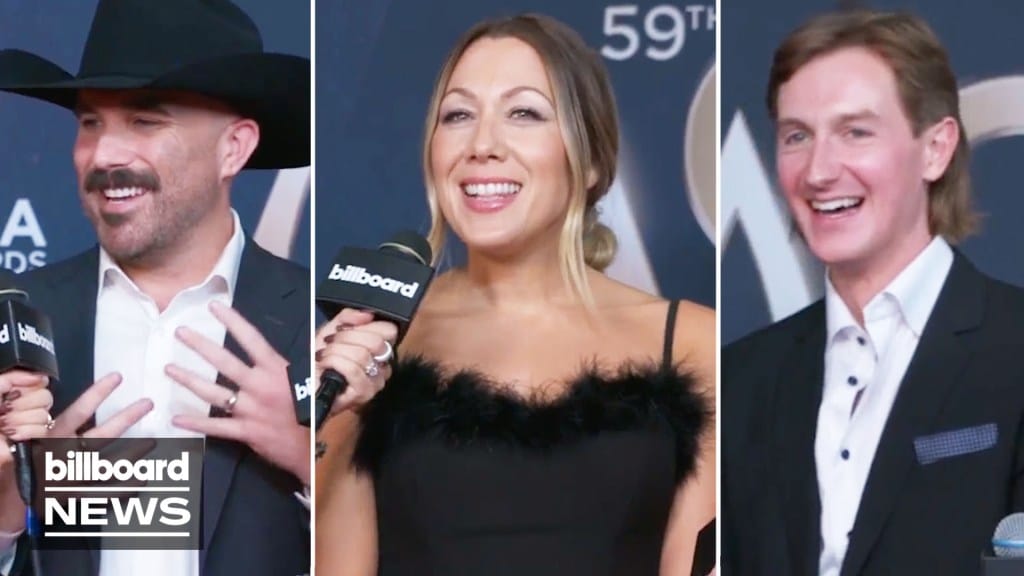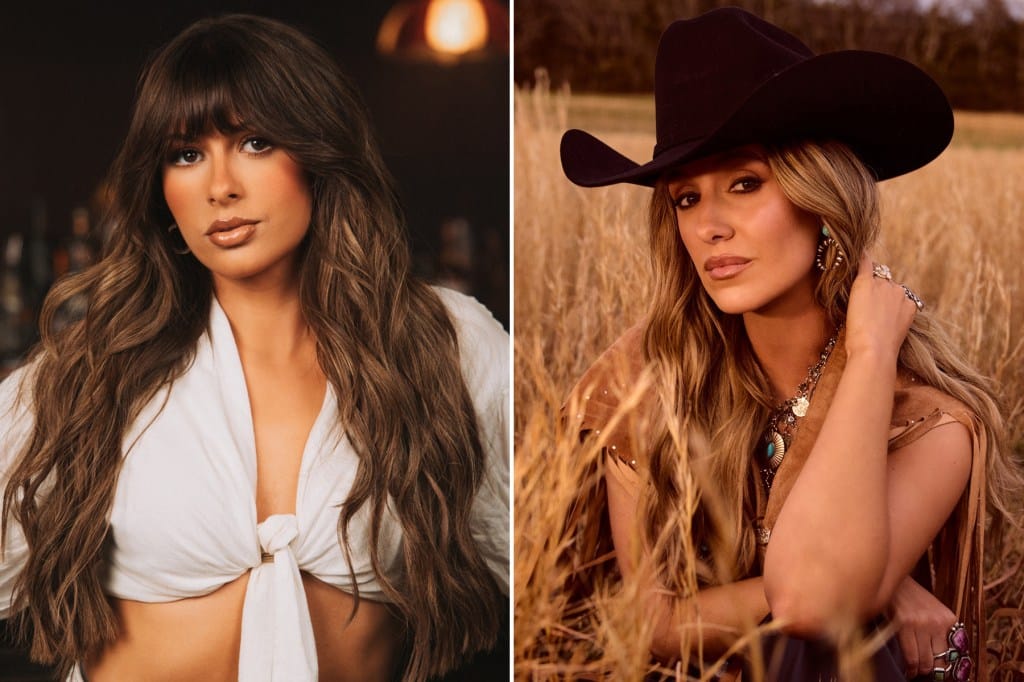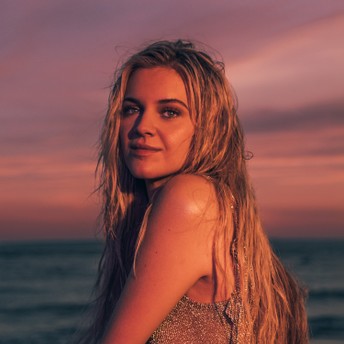genre country
Trending on Billboard Few times since Billboard’s Hot Country Songs and Country Airplay charts began coexisting have women ruled both lists in the same week. Just as Ella Langley scores her first Hot Country Songs No. 1, fellow country star Lainey Wilson captures her fifth leader on Country Airplay. Langley, who has logged five top […]
Trending on Billboard
As Kelsea Ballerini is preparing for a run of shows in Australia to wrap the year, she took a moment to answer questions from fans, and to ask her supporters for a favor.
Explore
See latest videos, charts and news
On her Instagram Stories, Ballerini fielded inquiries from fans, including one question that asked the singer-songwriter what she needed most from fans.
“Thank you for saying this and asking,” Ballerini replied. “I’m in a steady and happy place right now, truly excited for this Australia tour and the holidays.”
Ballerini added, “If I had one favor, it would be honoring that I’m trying to make my personal life personal for now. Unless it comes from me, it’s not from me, and that is really important in protecting my peace right now.”
Ballerini fielded several additional questions from fans, answering about everything from her workout routine to giving an update on the health of her dog Dibs, who has been battling cancer.
“Baby boy is hanging tough,” Ballerini wrote. “Leaving him this morning for our two-week Australia stint was *very* tough, but he’s steady, still fighting the cancer and has incredible doctors and care (and grandma who is going to give him extra treats while I’m gone). All of the good, healing energy you can send his way is appreciated, as always.”
Ballerini is gearing up for a run of Australian tour dates, launching Dec. 6-7 with two shows in Sydney at the ICC Sydney Theatre. Ballerini will play two shows at Melbourne’s Margaret Court Arena (Dec. 10-11) and wrap with a show at Brisbane Entertainment Centre on Dec. 13. Ballerini also recently released her EP Mount Pleasant on Nov. 14.
Ballerini also seems poised for an auspicious 2026; her album Patterns garnered a best contemporary country album nomination. The 2026 Grammy Awards will be held Feb. 1 at Crypto.com Arena in Los Angeles and will air live on CBS and Paramount+ Premium.
Trending on Billboard Tyler Childers will hit the road next year, when his 2026 Snipe Hunt Tour launches April 23 in Dallas, Texas. The trek will visit 14 cities along the way, including stops in St. Louis, Chicago and Seattle, before wrapping Oct. 3 in Portland, Oregon. His Snipe Hunt tour is presented by LN […]
Trending on Billboard
THE BIG STORY: It’s almost 2026. Music lawyers are grappling with streaming fraud, deepfakes and trillion-dollar battles over artificial intelligence. And the U.S. Supreme Court is talking about … file sharing?
Nearly 30 years after the industry-shaking debut of Napster, online piracy is no longer the existential threat it once was. (Don’t worry: We’ve got robot musicians to worry about now.) Are a commercially significant number of people really still illegally downloading music files when humanity’s full corpus of recorded music is available for $12?
But litigation moves at a glacial pace — and in the mid-2010s, piracy was still a big enough deal that the industry began cracking down on the internet service providers that enabled it. The biggest such case, filed in 2018 by Universal, Warner and Sony against Cox, eventually saw a jury award the labels a whopping $1 billion over piracy by Cox subscribers.
Related
Nearly seven years later, that case is now before the Supreme Court – something of a legal time capsule from an earlier technological era, but one that the justices are worried could lead to “extreme” outcomes for our current one.
For more, go read our full breakdown of the case and this week’s big oral arguments at the high court.
You’re reading The Legal Beat, a weekly newsletter about music law from Billboard Pro, offering you a one-stop cheat sheet of big new cases, important rulings and all the fun stuff in between. To get the newsletter in your inbox every Tuesday, go subscribe here.
Other top stories…
TALK THE LINE? The estate of Johnny Cash is suing Coca-Cola over ads that allegedly mimic the country legend’s voice – the first ever case to be brought under Tennessee’s recently enacted ELVIS Act aimed at prohibiting voice cloning in the A.I. era.
MEGAN THEE PLAINTIFF – A jury issued a verdict siding with Megan Thee Stallion in her defamation lawsuit against celebrity gossip blogger Milagro Gramz, who the star claims acted as Tory Lanez’s “mouthpiece” to spread misinformation after he shot Megan in 2020.
DIDDY V. NETFLIX – Lawyers for Sean “Diddy” Combs sent Netflix a cease-and-desist letter warning of litigation if the streamer releases a 50 Cent-produced docuseries Sean Combs: The Reckoning.
CAN’T SHAKE IT OFF – A federal judge refused to dismiss a lawsuit filed by hundreds of Taylor Swift fans over Ticketmaster’s botched sale of Eras Tour tickets three years ago, allowing the case to move ahead.
TAKE IT EASY – A judge rejected a civil lawsuit against Don Henley and Irving Azoff over the criminal prosecution of three men who allegedly tried to sell stolen Eagles lyrics – a case that ended in a spectacular collapse in 2024.
Related
DOING TIME – Fugees rapper Pras Michel was sentenced to 14 years in prison following his conviction on illegal foreign lobbying and conspiracy charges linked to Jho Low, the Malaysian financier who masterminded the 1MDB corruption scandal.
RESTAURANT ROW – Usher is suing music producer Bryan-Michael Cox and other organizers of a failed Atlanta restaurant project, claiming they misused money he loaned and still owe him $700,000.
MJ BIOPIC – Michael Jackson’s daughter Paris fired a legal broadside at the executors of her father’s estate, claiming a looming Michael movie and other projects are designed to “enrich and aggrandize” them rather than build wealth for the family.
FEE FIGHT – Nelly is demanding that a lawyer for one of his former St. Lunatics bandmates repay more than $78,000 he spent in legal bills to defeat her “frivolous” lawsuit over the rights to his debut album Country Grammar.
“STRONG WORDS” – Live Nation and Ticketmaster filed a long-awaited motion for summary judgment seeking to end the Justice Department’s sweeping antitrust case – claiming the feds used “strong words” that do not have “a lick of truth to them.”
MORE ACCUSERS – Two more of Smokey Robinson’s former employees — a woman and a man — came forward with claims that the 85-year-old Motown singer sexually assaulted them, adding to four earlier accusers.
LYRIC LITIGATION – GloRilla won a ruling dismissing — for now, at least — a lawsuit that accused her of stealing a social media personality’s viral catchphrase “all natural, no BBL” with the lyrics to her 2024 song “Never Find.”
CASE DROPPED – An appeal filed by Making the Band contestant Sara Rivers aimed at reviving her $60 million sexual assault lawsuit against Sean “Diddy” Combs was abruptly dismissed — a move that came after her lawyers failed to file basic court forms.
CASE TOSSED – A judge dismissed a civil lawsuit filed against Kevin Liles by an anonymous executive assistant who claimed she was sexually assaulted by the legendary record executive at Def Jam in the early 2000s.
GOING PUBLIC – StubHub is facing a class action claiming it hid key details from investors ahead of its $758 million initial public offering (IPO) in September.
TRIAL SET – Aaron Carter’s family will head to trial next year in a wrongful death lawsuit against doctors and pharmacies that allegedly gave the late singer access to Xanax pills before he drowned in a bathtub in 2022.
Trending on Billboard
The 61st Academy of Country Music Awards will return to the MGM Grand Garden Arena in Las Vegas next year following three years at Ford Center at the Star in Frisco, Texas.
The show will stream live on Prime Video and the Amazon Music channel on Twitch on Sunday, May 17. This will be the fourth consecutive year that the ACM Awards have streamed on Prime Video and it will make the show’s first time on a Sunday night, regarded as the optimal night for awards show viewing, since 2021. The show was held on a Thursday night in its first three outings on Prime Video.
“We couldn’t be more thrilled to return to MGM Grand for the 61st ACM Awards next May, a place that holds a lot of history and special memories for the Academy,” Damon Whiteside, CEO, Academy of Country Music, said in a statement. “It truly feels like a homecoming for us. There’s no better place to host an exciting, global country music celebration than fabulous Las Vegas!”
Jay Penske, CEO, Dick Clark Productions, added: “2026 is going to be a very special year for the ACMs, and partnering with MGM Resorts strengthens our deep commitment to delivering world-class entertainment and experiences for country music fans and partners alike.”
The ACM Awards were held at the MGM Grand Garden Arena from 2006-14 and returned to the venue in 2016 and again from 2018-19. The venue has also hosted the Billboard Music Awards, the Latin Grammy Awards, iHeartRadio Music Festival and more.
ACM Awards Week will kick off in Las Vegas on Friday, May 15. Tickets for the 61st ACM Awards and surrounding ACM Awards Week events will go on sale in early 2026.
The show’s host has yet to be named. Reba McEntire hosted the last two ACM Awards ceremonies, the latest in the 18 total that she has hosted or co-hosted. If she hosts one more ACM Awards ceremony, she’ll tie Bob Hope’s record for hosting or co-hosting the most iterations of a major awards show. Hope fronted the Oscars 19 times from 1940 through 1978. McEntire first co-hosted the ACM Awards in 1986.
In recent years, the ACM Awards ceremony has featured notable pairings of pop and country superstars, including Ed Sheeran & Luke Combs, Dua Lipa & Chris Stapleton, and Backstreet Boys & Rascal Flatts.
Established in 1966, the Academy of Country Music Awards is the longest-running country music awards show. The Country Music Association Awards were first presented in 1967. The CMA Awards were, however, the first country awards show to be televised, in 1968. The ACM Awards were first televised in 1972.
The ACM Awards aired on all three major networks – ABC (1972–78), NBC (1979–97) and CBS (1998–2021), before moving to Prime Video in 2022, when it made history as the first major awards ceremony to exclusively livestream. The 2022 ACM Awards ceremony received a Primetime Emmy nod for outstanding technical direction, camerawork, video control for a special. It was the show’s first Emmy nod in 36 years.
The ACMs have been held in Las Vegas in all but six years since 2003. In 2015, the show was held at AT&T Stadium in Arlington, Texas; in the pandemic years of 2020-21, the show was held at three iconic venues in Nashville; and for the last three years it was held at Ford Center at the Star in Frisco, Texas.
The ACM Awards are produced by Dick Clark Productions, which is owned by Penske Media Eldridge, a joint venture between Eldridge Industries and Billboard parent company Penske Media.
Trending on Billboard
The estate of Johnny Cash has brought a lawsuit accusing Coca-Cola of illegally hiring a tribute singer to mimic the country legend’s voice in a college football advertisement.
The federal court complaint, filed on Tuesday (Nov. 25) in Nashville, is the first high-profile case to be brought under Tennessee’s recently enacted ELVIS Act. Effective last summer, the novel statute expanded the state’s right of publicity to explicitly protect a person’s voice from nonconsensual exploitation.
Related
The John R. Cash Revocable Trust, which manages the estate of the singer who died in 2003, takes issue with a new song in a Coca-Cola commercial that’s been airing during college football games since August. The lawsuit claims the voice behind the jingle sounds “remarkably” similar to Cash’s signature bass-baritone — and that, in fact, it’s the voice of a professional Cash tribute performer named Shawn Barker.
“Stealing the voice of an artist is theft. It is theft of his integrity, identity and humanity,” wrote a lawyer for the Cash estate, Tim Warnock of Loeb & Loeb. “The trust brings this lawsuit to protect the voice of Johnny Cash — and to send a message that protects the voice of all of the artists whose music enriches our lives.”
According to the lawsuit, the Cash estate regularly licenses out the legendary performer’s intellectual property. For example, his songs “Ragged Old Flag” and “Personal Jesus” have both been featured in Super Bowl telecasts. But the estate says Coca-Cola “never even bothered to ask the trust for a license” before using a voice soundalike in its commercial.
“This case arises from Coca-Cola’s pirating Johnny Cash’s voice in a nationwide advertising campaign to enrich itself — without asking for permission or providing any compensation to the humble man and artist who created the goodwill from which Coca-Cola now profits,” reads the complaint.
Related
The estate is asking for a court injunction that would take the ad off screens, plus financial damages for Coca-Cola’s alleged violation of Cash’s rights of publicity under the ELVIS Act. Damages are also sought for supposed violations of a Tennessee consumer protection statute and a federal law against false endorsements.
Coca-Cola did not immediately return a request for comment on Wednesday (Nov. 26). A rep for Barker, who is not a defendant in the lawsuit, told Billboard the tribute singer’s team was “thrilled when we were approached to have Shawn sing vocals for this commercial.”
“Shawn Barker has been performing with his Cash tribute ‘The Man in Black: A Tribute to Johnny Cash’ for over two decades, touring the world sharing his love of Johnny Cash’s music and stories with fans both old and new,” added Barker’s manager, Joey Waterman.
This is the first major lawsuit to take advantage of Tennessee’s new voice protections under the ELVIS Act, short for the Ensuring Likeness Voice and Image Security Act of 2024. It’s worth noting, though, that there is no allegation of artificial intelligence-powered voice mimicking in the Coca-Cola commercial, which Tennessee lawmakers were vocal about curbing when they expanded the state’s right of publicity law last year.
Related
Rather, the Cash estate’s lawsuit follows in the footsteps of historic litigation brought by artists over sound-alike singers mimicking their voices. Bette Midler famously sued Ford over a series of commercials featuring impersonator vocals in the 1980s, winning a precedent-setting victory that established voices as protectable rights of publicity in California.
Midler’s case limited these enforcement rights to the commercial advertising context — that is, advertisements that use a celebrity’s likeness to make it appear they’re endorsing a product. This same limitation applies to most laws in the patchwork of state-level publicity rights throughout the United States. However, the newly minted ELVIS Act is different: It expands liability so that one can sue any individual for trampling their publicity rights in Tennessee.
The Cash estate’s Coca-Cola lawsuit stays in the traditional commercial lane. But now that the ELVIS Act is in effect, it’s possible we’ll see more novel right of publicity lawsuits brought over soundalikes in recorded songs.
Rick Astley waded into this area in 2023, before the ELVIS Act was passed, by suing Yung Gravy for mimicking his voice in the rapper’s breakout hit “Betty (Get Money).” That case, which sparked debate about the commercial limits of publicity rights, settled before a judge could rule on its merits.

Trending on Billboard On the red carpet of the CMA Awards 2025, we caught up with Brett Young, Cooper Alan and many more to debate when they put up their Christmas decorations and whether there is such a thing as “too early.” Rania Aniftos: This is very controversial, so answer carefully: Do you decorate for […]
Trending on Billboard
Nashville’s community came to the aid of those in need this Thanksgiving week. Country artist Tracy Lawrence has been hosting his annual Mission: Possible Turkey Fry and Benefit Concert for two decades, frying up turkeys and helping put together Thanksgiving meals for those in the community.
Explore
See latest videos, charts and news
This year, the event weathered a snag after a refrigerated truck broke down, spoiling 650 of the 3,600 allotment of turkeys. Lawrence then asked for the community’s help. Nashville’s denizens, including country artist and “Wind Up Missin’ You” hitmaker Tucker Wetmore, came to his aid.
Wetmore himself went to Costco and loaded his truck with more than 100 turkeys and took them to the turkey fry, helping Lawrence and many others cook up the poultry. Several artists and celebrities also helped out with the turkey fry, including Jamey Johnson, Charles Esten, Dustin Lynch, Meghan Patrick, John Crist, Rodney Atkins, Clint Black, Rhett Akins and Frank Ray, while artists such as Atkins, Black, Akins, Esten and Steve Wariner also donated turkeys.
Overall, people from Nashville and surrounding areas donated more than 2,400 turkeys, for a total of 5,350 cooked and frozen distributed turkeys, helping to provide upward of 50,000 meals.
“I cannot imagine a better 20th anniversary for the Mission:Possible Turkey Fry and Concert,” Lawrence said in a statement. “What started as a day of uncertainty turned into a day of our community coming together in a way I couldn’t have imagined. Between the fry itself and the benefit concert with my friends Gretchen, Chris, Eric and Halfway to Hazard, I was blown away once again by the kindness of our neighbors.”
The music portion of the event featured artists including Lawrence, Gretchen Wilson, Chris Cagle, Eric Paslay and Halfway to Hazard performing at Luke Combs’ Category 10. The event raised $355,000 for Mission: Possible from ticket sales, silent auction items and artist donations, and presented a check to Nashville Rescue Mission for $250,000. This year, the event also hosted a canned food drive on behalf of Second Harvest Food Bank to help those impacted by food insecurity.
See a video from the event below:
Trending on Billboard
Megan Moroney and Morgan Wallen were never officially dating, or exclusive, as far as their fans know. But there was definitely something between the two country stars a few years ago when they were linked following the release of Moroney’s suggestive “Tennessee Orange,” a love song about a Georgia girl who falls in love with a charming Tennessee man that hit No. 30 on the Billboard Hot 100 in October of 2022.
Explore
See latest videos, charts and news
“I think Morgan is great and his new album [I’m the Problem] is great,” Savannah, Ga. native Moroney told People magazine about the latest album from Sneedville, Tennessee’s Wallen, 32. “Him and I are still friends.”
Moroney, 28, said she is well-aware that people love to dig into the unspoken meaning behind her lyrics, telling the magazine that she is focused on “being honest” in her songs. “I never let the possibility that people might speculate who [a song] is about, stop me from writing about how this situation made me feel,” said the singer. In “Tennessee Orange” Moroney calls to tell her mom — and warn her dad — that “I met somebody and he’s got blue eyes/ He opens the door, and he don’t make me cry/ He ain’t from where we’re from, but he feels like home/ Yeah, he’s got me doing things I’ve never done.”
At the time, fans speculated about the possible Wallen link to “Tennessee Orange,” after the country stars started commenting on each other’s Instagram posts. In a 2024 Call Her Daddy podcast appearance Moroney said the pair “never exclusively” dated and wouldn’t confirm that the song is about Wallen, who she met right before the 2020 COVID-19 pandemic when she was a senior in college.
“We were friends for a long time. We were not just friends. And now we’re friends,” she explained at the time. “I feel like he’s a very private person. We weren’t exclusively dating ever and I think that both of our schedules… when we tried to hang out it was like, ‘OK, we have this one day of the whole month where we’re both maybe in town and then the other has something going on.’”
Between her song, the Instagram comments and Wallen’s 2023 One Thing at a Time song “Tennessee Fan” — about him meeting a sorority girl from Alabama who rolls her allegiance over to Tennessee after he takes her to a Vols college football game — fans had lots of thoughts on their potential love affair.
And though Wallen has not spoken in public about their connection, in a 2022 interview with SiriusXM’s The Highway in 2022, Moroney confirmed that the Vols shirt she wore in a promo photo for “Tennessee Orange” belonged to Wallen.
Trending on Billboard Luke Combs has performed on many of the most coveted stages around the world, but this two-time CMA entertainer of the year winner would also be open to performing on ‘s biggest stage. During his Nov. 24 appearance on MNF Manningcast, hosted by NFL quarterback greats Eli and Peyton Manning, the discussion […]

 State Champ Radio
State Champ Radio 








